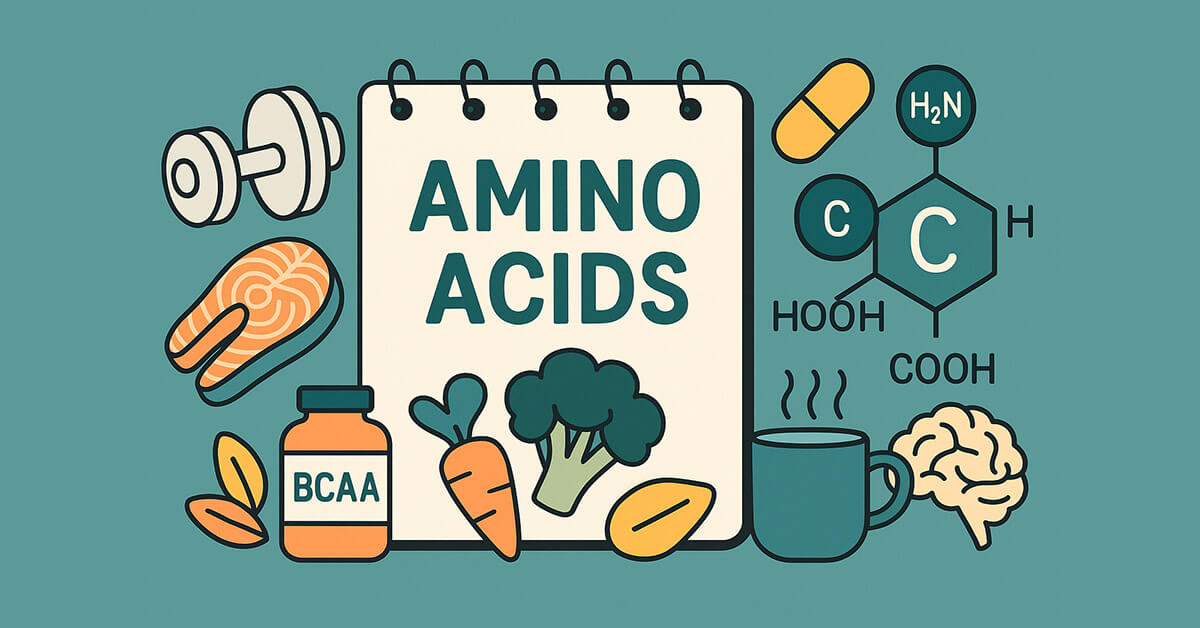
The Ultimate Guide to Amino Acids

Amino acids are often called the building blocks of life, and for good reason. They make up proteins, support energy production, and influence everything from muscle repair to mood and focus. Without the right balance of amino acids, your body and brain simply don’t function at their best. Whether you’re an athlete, a busy professional, or just someone looking to improve overall health, understanding amino acids can open new doors to better energy, performance, and mental clarity.
In this guide, we’ll explore all the major amino acids in detail. You’ll learn what they are used for, how they work in everyday life, and why supplements can make a difference when diet alone doesn’t provide enough. Let’s start with the essentials—the ones your body cannot make on its own.
Essential Amino Acids
Essential amino acids are those your body can’t produce by itself, so you must get them through food or supplements. They’re vital for muscle growth, recovery, hormone balance, and overall health. Here’s what each one does in real life.
| Essential amino acids | Main benefits |
|---|---|
| L-Histidine | Tissue repair and immune defense |
| L-Isoleucine | Energy during exercise and endurance support |
| L-Leucine | Muscle growth and recovery |
| L-Lysine | Collagen production and immune support |
| L-Methionine | Detox support and antioxidant defense |
| L-Phenylalanine | Mood and focus support |
| L-Threonine | Joint health and digestive function |
| L-Tryptophan | Better sleep and mood regulation |
| L-Valine | Muscle repair and reducing fatigue |
L-Histidine
What is it used for? Tissue repair and immune defense.
L-Histidine is a precursor to histamine, which plays a role in immune response, digestion, and sexual function. It’s also important for repairing tissues and producing red and white blood cells. In practical terms, histidine supports your body’s defenses and recovery processes whenever you face stress or injury.
L-Isoleucine
What is it used for? Energy during exercise and endurance support.
L-Isoleucine helps your muscles use glucose more efficiently during workouts, giving you steady energy and delaying fatigue. Endurance athletes appreciate isoleucine because it supports stamina, while strength athletes value its role in faster recovery. Think of it as the fuel manager in your amino acid toolkit, keeping energy flowing when you need it most.
L-Leucine
What is it used for? Muscle growth and recovery.
L-Leucine is one of the most important amino acids for athletes and anyone looking to maintain strong muscles. It directly activates the mTOR pathway, which triggers muscle protein synthesis. In practice, this means leucine is the spark that tells your body to start repairing and building muscle after a workout. If you’ve ever taken BCAAs or a post-workout shake, leucine was likely doing the heavy lifting.
L-Lysine
What is it used for? Collagen production and immune support.
L-Lysine is essential for producing collagen, which keeps your skin, bones, and joints strong. It also plays a role in calcium absorption, making it important for bone health. Many people take lysine to help prevent cold sores, since it can interfere with viral replication. In everyday terms, lysine helps you stay resilient inside and out.
L-Methionine
What is it used for? Detox support and antioxidant defense.
L-Methionine is a sulfur-containing amino acid that helps your body produce glutathione, one of its most powerful natural antioxidants. This means methionine plays a role in detoxification, liver health, and protecting cells from oxidative stress. It’s also important for hair, skin, and nail strength, making it relevant beyond fitness and into daily wellness.
L-Phenylalanine
What is it used for? Mood and focus support.
L-Phenylalanine is the starting point for producing dopamine, norepinephrine, and epinephrine—the neurotransmitters that control mood, motivation, and alertness. When you’re short on phenylalanine, you may feel low in energy or mentally sluggish. Supplementing can support better focus and a more balanced mood, especially during stressful times.
L-Threonine
What is it used for? Joint health and digestive function.
L-Threonine is crucial for forming connective tissues like collagen and elastin, making it helpful for joint and skin health. It also supports healthy digestion by contributing to the production of mucus in the gut lining. In real life, this means threonine helps you move comfortably and keep your digestive system running smoothly.
L-Tryptophan
What is it used for? Better sleep and mood regulation.
L-Tryptophan is best known for its role in producing serotonin and melatonin. These neurotransmitters regulate mood and sleep, so tryptophan is often used as a natural sleep aid or mood support supplement. If you’ve ever felt relaxed after a Thanksgiving turkey dinner, tryptophan was part of the reason why.
L-Valine
What is it used for? Muscle repair and reducing fatigue.
L-Valine works hand in hand with leucine and isoleucine as part of the BCAA trio. It helps repair muscle tissue and reduces exercise-induced fatigue, making it especially helpful after long training sessions. In daily life, valine supports tissue recovery whenever your body is under stress, not just after workouts.
Conditionally Essential Amino Acids
Conditionally essential amino acids are usually produced by your body, but in times of stress, illness, or intense physical activity, you may need extra from diet or supplements. These amino acids become especially important when your system is under pressure and recovery is key.
| Conditionally Essential Amino Acids | Main benefits |
|---|---|
| L-Arginine | Blood flow, circulation, and performance |
| L-Citrulline | Boosting endurance and recovery |
| Cysteine | Antioxidant production and detox support |
| Glutamine | Recovery, gut health, and immunity |
| Glycine | Sleep quality and joint health |
| Ornithine | Detox and reducing fatigue |
| Proline | Skin and connective tissue strength |
| Tyrosine | Focus and stress resilience |
L-Arginine
What is it used for? Blood flow, circulation, and performance.
L-Arginine is famous for its role in producing nitric oxide, which relaxes and widens blood vessels. This means better circulation, improved workout performance, and even support for heart health. Athletes often use arginine for endurance and pumps, but it’s also valued for promoting healthy blood pressure and circulation in daily life.
L-Citrulline
What is it used for? Boosting endurance and recovery.
L-Citrulline converts into arginine in the body, enhancing nitric oxide production and improving blood flow. In practice, this translates to better stamina during exercise, less fatigue, and quicker recovery. It’s a favorite in pre-workout formulas, but also helps with circulation for people who simply want to feel more energetic throughout the day.
Cysteine
What is it used for? Antioxidant production and detox support.
L-Cysteine helps your body create glutathione, the “master antioxidant” that protects cells from damage and supports detoxification. This makes cysteine valuable for liver health, immunity, and reducing oxidative stress. In everyday terms, it’s like an internal shield that keeps your system resilient against modern life’s challenges.
Glutamine
What is it used for? Recovery, gut health, and immunity.
L-Glutamine is the most abundant amino acid in your body, but stress and hard workouts can deplete it. Supplementing helps speed up muscle recovery, support the gut lining, and strengthen immune defenses. In real life, this means fewer post-workout crashes and better resilience when life gets demanding.
Glycine
What is it used for? Sleep quality and joint health.
Despite being one of the simplest amino acids, glycine packs a big punch. It helps your body produce collagen for healthy skin and joints, and it also supports deeper, more restorative sleep. Many people take glycine before bed to relax and wake up feeling refreshed rather than groggy.
Ornithine
What is it used for? Detox and reducing fatigue.
L-Ornithine plays a role in the urea cycle, which helps the body remove excess nitrogen and reduce toxic buildup from protein metabolism. Athletes sometimes use it to reduce feelings of fatigue during long workouts. In day-to-day life, ornithine supports liver health and the body’s ability to handle stress and recovery.
Proline
What is it used for? Skin and connective tissue strength.
L-Proline is a key component of collagen, making it important for healthy skin, cartilage, and ligaments. If you’re interested in anti-aging or keeping your joints strong, proline plays a behind-the-scenes role in supporting resilience and repair. It’s one of those amino acids you don’t often hear about but that works quietly to keep your body strong.
Tyrosine
What is it used for? Focus and stress resilience.
L-Tyrosine is a precursor to dopamine, norepinephrine, and adrenaline. This makes it incredibly useful for focus, alertness, and staying sharp under stress. Students, shift workers, and people with demanding jobs often use tyrosine to prevent mental fatigue during long or stressful days.
Non-Essential Amino Acids
Non-essential amino acids can be made by your body, but that doesn’t mean they aren’t important. They support brain health, digestion, connective tissue, and more. Let’s look at the key ones and what they actually do in real life.
| Non-Essential Amino Acids | Main benefits |
|---|---|
| Alanine | Blood sugar balance and energy during exercise |
| Asparagine | Protein balance and nervous system support |
| Aspartic Acid | Energy production and hormone regulation |
| Glutamic Acid | Learning, memory, and gut health |
| Serine | Brain function and metabolism |
Alanine
What is it used for? Blood sugar balance and energy during exercise.
L-Alanine helps your body manage glucose and provides energy to muscles during exercise. It’s especially useful during endurance activities, as it can reduce muscle breakdown and stabilize energy levels. For everyday life, alanine helps regulate blood sugar and maintain steady energy throughout the day.
Asparagine
What is it used for? Protein balance and nervous system support.
Asparagine helps maintain a healthy balance of proteins in the body and supports the nervous system. While it’s not as famous as other amino acids, it’s still a key player in how your body processes and uses nutrients. In daily life, it quietly supports endurance and recovery from both physical and mental effort.
Aspartic Acid
What is it used for? Energy production and hormone regulation.
Aspartic acid is involved in the Krebs cycle, where your body produces energy at the cellular level. It’s also linked to hormone regulation, particularly testosterone production. For people looking for steady energy and balanced hormones, aspartic acid plays a behind-the-scenes role that can make a noticeable difference.
Glutamic Acid
What is it used for? Learning, memory, and gut health.
Glutamic acid acts as an excitatory neurotransmitter in the brain, which makes it important for learning and memory. It also supports gut health as a source of energy for intestinal cells. In daily life, glutamic acid helps you stay sharp mentally while also keeping digestion running smoothly.
Serine
What is it used for? Brain function and metabolism.
L-Serine is vital for producing phospholipids in cell membranes and plays a role in nervous system health. In everyday terms, it helps keep your brain and nerves working smoothly. Some people explore serine for memory support and age-related cognitive decline, but it’s also quietly involved in many metabolic processes that keep you going.
Popular Amino Acid Supplements
Beyond the individual amino acids, there are certain supplements that have become especially popular thanks to their noticeable benefits for energy, performance, mood, or recovery. Here are the ones you’re most likely to encounter and why people use them.
| Popular Amino Acid Supplements | Main benefits |
|---|---|
| 5-HTP | Mood balance and better sleep |
| BCAA | Muscle recovery and workout energy |
| EAA | Complete amino acid support for overall health |
| Beta-Alanine | Endurance and reducing muscle fatigue |
| Creatine | Strength, power, and cognitive support |
| L-Carnitine and Acetyl-L-Carnitine | Fat metabolism and brain energy |
| Taurine | Energy, hydration, and heart health |
| Theanine | Calm focus and stress relief |
5-HTP
What is it used for? Mood balance and better sleep.
5-HTP is a direct precursor to serotonin, making it a natural option for mood support and sleep regulation. Many people use it to improve emotional balance or as a gentle sleep aid. In everyday life, 5-HTP can help take the edge off stress and support a more positive mindset.
BCAAs (Branched-Chain Amino Acids)
What is it used for? Muscle recovery and workout energy.
BCAAs include leucine, isoleucine, and valine, and they’re staples in the fitness world. They’re often taken during workouts to reduce muscle breakdown and promote faster recovery. While whole protein sources provide BCAAs naturally, supplements can be useful if you train hard or want a quick intra-workout boost without heavy digestion.
Essential Amino Acid Blends (EAA)
What is it used for? Complete amino acid support for overall health.
Unlike BCAAs that focus on three amino acids, EAA blends provide all nine essential amino acids in one formula. They’re popular for supporting muscle growth, recovery, and even general wellness. If you want broad coverage without piecing together individual supplements, EAAs are a convenient choice.
Beta-Alanine
What is it used for? Endurance and reducing muscle fatigue.
Beta-alanine is the amino acid behind that familiar tingling sensation you might feel after taking pre-workout supplements. It helps increase carnosine levels in muscles, which buffers lactic acid and delays fatigue. In practice, this means you can push harder for longer during training sessions.
Creatine
What is it used for? Strength, power, and cognitive support.
Creatine is one of the most researched supplements in the world. It helps your muscles produce more ATP, the energy currency of the body, which translates into more strength, endurance, and power. Interestingly, creatine is also being studied for its brain benefits, supporting memory and focus. It’s useful for athletes but also for anyone who wants more physical and mental energy.
L-Carnitine and Acetyl-L-Carnitine
What is it used for? Fat metabolism and brain energy.
L-Carnitine helps shuttle fatty acids into the mitochondria to be used as energy, making it a popular supplement for fat metabolism and exercise endurance. Acetyl-L-Carnitine, a more brain-focused form, supports memory, alertness, and overall cognitive energy. Together, these forms cover both physical and mental performance.
Taurine
What is it used for? Energy, hydration, and heart health.
Taurine is often added to energy drinks, but it’s much more than just a buzzword. It helps regulate hydration, supports cardiovascular function, and may improve exercise performance. In real life, taurine can help you stay energized and balanced, especially during long, demanding days or workouts.
Theanine
What is it used for? Calm focus and stress relief.
Many people take Theanine as a standalone supplement or pair it with caffeine for improved focus and reduced stress. It’s a practical option for students, professionals, or anyone who wants calm productivity.
Conclusion
Amino acids are far more than scientific terms on the back of a supplement label. They are the foundation of your energy, focus, mood, recovery, and overall vitality. By understanding what each amino acid does, you can make smarter choices for your health—whether that’s supporting muscle growth with leucine, improving focus with tyrosine, or enhancing recovery with glutamine.
If you eat a balanced diet rich in protein, you’re already getting many of these amino acids naturally. But during times of stress, intense training, or when specific goals are in focus, targeted amino acid supplements can provide that extra edge. With so many options available, there’s an amino acid to support almost every aspect of daily life—from sharper thinking to better sleep to stronger performance in the gym.
Use this guide as your roadmap, explore individual amino acid profiles, and discover how they can fit into your lifestyle. Small adjustments today can translate into clearer focus, better recovery, and improved long-term health tomorrow.
FAQ about Amino Acids
What are amino acids in simple terms?
Amino acids are the small building blocks that make up proteins. Your body uses them to repair tissues, create hormones, and produce energy for both your muscles and brain.
Do I really need amino acid supplements if I eat protein?
Most people get enough amino acids through protein-rich foods like meat, eggs, fish, beans, and dairy. Supplements can be helpful if you train hard, follow a restrictive diet, or want extra support for mood, energy, or sleep.
What is the difference between essential and non-essential amino acids?
Essential amino acids must come from your diet because your body cannot make them. Non-essential amino acids can be produced by your body, but that doesn’t mean they aren’t important—they still play critical roles in health and recovery.
Are amino acids safe to take daily?
For most people, amino acid supplements are safe when taken in recommended amounts. It’s best to start with moderate doses and consult a healthcare provider if you have medical conditions or are on medication.
Which amino acids are best for brain fog and focus?
Tyrosine, Theanine, and Acetyl-L-Carnitine are particularly useful for mental clarity and focus. They support neurotransmitters and brain energy, helping you feel more alert without overstimulation.
This article was originally published on Stackbb, your trusted source for science-based supplement guides.







